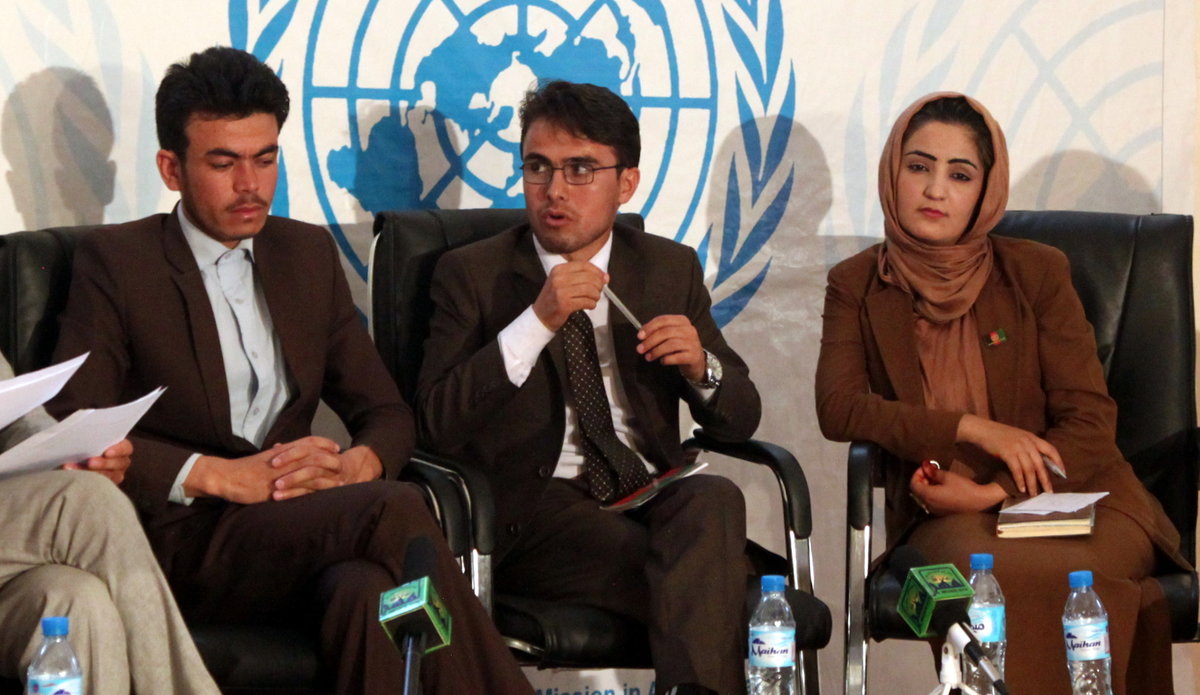Young Afghans essential for peace-building in country’s northeast
KUNDUZ - The active participation of young Afghans in peace-building is necessary for creating a more stable, inclusive and peaceful region, says a Kunduz-based activist.
In a series of events backed by the Kunduz regional office of the UN Assistance Mission in Afghanistan (UNAMA) last year, including radio and television programmes, young Afghans came together to discuss their role in building peace in their communities and to strategize on ways to participate more in Afghanistan’s political and social life.
One young woman who attended the events, not only as a radio panellist but also as a civil society representative at an October symposium to establish an northeast NGO network, has put her ideas about the importance of youth into practice by organizing several new community programmes.
“Young Afghans can be agents of change, with their fresh ideas and dynamic minds,” says Gita Bashardoost, who, in her most recent initiative, brought together more than 200 school girls to inspire them to think about how they can work toward peace in their communities.
In an interview with the UN, Bashardoost says she will continue to advocate for the broad inclusion of young Afghans in peace initiatives because of their resourcefulness and energy in bringing positive change to their communities.
“I call on all young people to work for unity and solidarity, and to avoid ethnic division,” she says.
As an activist, Bashardoost has been a constant fixture in Kunduz civic programmes, featured on radio stations advocating for peace and unity, and urging other young people to work together to participate more actively in Afghanistan’s social and political life.
While young Afghans in Kunduz face significant challenges, including illiteracy and unemployment, there is a growing recognition that any peace process in Afghanistan must be inclusive and must therefore involve young people. That concept is reaffirmed by Security Council Resolution 2282 (2016), which recognizes the importance of youth in deterring and resolving conflict.
Bashardoost’s activities are among many other similar programmes, events and initiatives that have emerged as a result of UNAMA reaching out to a range of groups across the country, creating spaces, both physical and on social media, for them to come together and discuss issues that are of critical importance to them and to strategize on the best way forward.
One way that UNAMA reaches out is through its strong partnerships with local media outlets across the country. At almost every UNAMA-backed event, local media partners not only record the discussion and debate for later rebroadcast, but also create new programmes around the issues that are raised, extending the discussion and creating new opportunities for local voices to be heard on issues such as peace, reconciliation, social harmony, transparency, human rights and rule of law.
Kunduz is one of the 34 provinces of Afghanistan, located in the northeast of the country. Together with Takhar, Baghlan and Badakhshan, it makes up the north-eastern region of the country, sharing a border with Tajikistan to the north, Pakistan to the south and China to the east.
UNAMA supports the Afghan people and government to achieve peace and stability. In accordance with its mandate as a political mission, UNAMA backs conflict prevention and resolution, promoting inclusion and social cohesion, as well as strengthening regional cooperation. The Mission supports effective governance, promoting national ownership and accountable institutions that are built on respect for human rights.
UNAMA provides 'good offices' and other key services, including diplomatic steps that draw on the organization’s independence, impartiality and integrity to prevent disputes from arising, escalating or spreading. The Mission coordinates international support for Afghan development and humanitarian priorities.
 UN
UN







